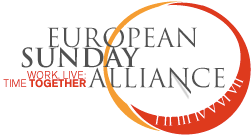 In a statement released on Tuesday, 14 October 2025, the European Sunday Alliance (ESA) welcomed the European Commission’s initiative to explore legislative measures on fair telework and the right to disconnect. Read the ESA opinion
In a statement released on Tuesday, 14 October 2025, the European Sunday Alliance (ESA) welcomed the European Commission’s initiative to explore legislative measures on fair telework and the right to disconnect. Read the ESA opinion
The Alliance called on the European Commission to “consider a regulation on the right to disconnect, either in addition to or in the form of a new Working Time Directive,” and “to include a common day of rest in such a legislative proposal.”
COMECE is a founding member of the European Sunday Alliance. The Alliance is a broad network of more than 100 national Sunday alliances, trade unions, employers’ organisations, civil society associations, churches, and religious communities in the European Union. It is committed to raising awareness about the unique value of Sunday for society and the importance of a common day of rest.
The ESA opinion reads:
The right to disconnect’ refers to a worker’s right to be able to disconnect from work and refrain from engaging in work-related electronic communication, such as emails and other messages, during non-work hours and holidays. The European Sunday Alliance (ESA) welcomes the European Commission’s initiative to explore legislative measures on fair telework and a right to disconnect.
In the view of the European Sunday Alliance, this is an opportunity to address growing challenges faced by workers in the context of digitalisation and remote work whilst ensuring workers’ rights to health and safety at work as well as work life balance.
The Working Time Directive (2003/88/EC) by defining working time, maximum working hours and minimum daily and weekly rest periods that should be respected in order to safeguard workers’ health and safety refers to a number of rights that indirectly relate to ‘right to disconnect’ issues.
Therefore, the European Sunday Alliance strongly supports a directive or an addition to the current Working time directive that ensures and clarifies a right to disconnect for all workers.
It is evident that synchronising resting time as well as disconnection contribute significantly to the physical and mental health of workers and their families. As noted in Article 2 of the European Social Charter and Article 31 of the EU Charter of Fundamental Rights, workers are entitled to just working conditions, including a weekly day of rest as already defined in the EU Working Time Directive. However, constant connectivity and the pressures of an ‚always-on‘ culture including on weekends and on Sundays result in increased stress, burnout, and related health issues for workers, especially in times when more and more people work from home.
While telework offers flexibility and productivity gains, it also exacerbates the blurring of work-life boundaries, especially on weekends and in the evenings. A structured approach to telework must protect workers from excessive availability expectations.
The European Sunday Alliance emphasises the importance of ensuring disconnection/rest periods during weekends, particularly on Sundays, and on evenings to address these risks and guarantee quality jobs.
The European Sunday Alliance therefore calls on the European Commission to consider a regulation on the right to disconnect in addition or in the form of a new Working time directive. The Alliance also keeps on arguing for a common day of rest – which shall, as far as possible, coincide with the day recognised by tradition or custom in the country or region concerned as a day of rest (in practice on Sundays) – to be included in a legislative proposal for a possible new working time directive.

